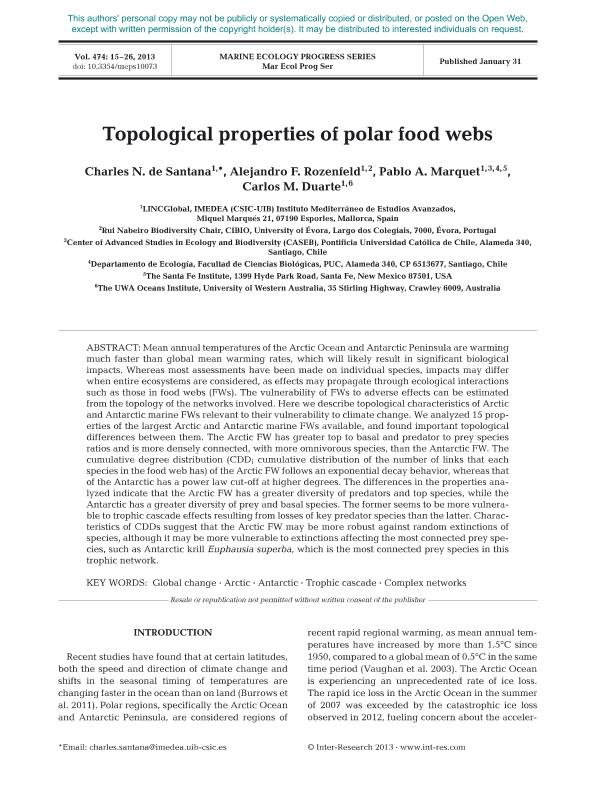Mostrar el registro sencillo del ítem
dc.contributor.author
de Santana, Charles N.
dc.contributor.author
Rozenfeld, Alejandro Fabian

dc.contributor.author
Marquet, Pablo A.
dc.contributor.author
Duarte, Carlos M.
dc.date.available
2016-08-09T20:21:01Z
dc.date.issued
2013-01
dc.identifier.citation
de Santana, Charles N.; Rozenfeld, Alejandro Fabian; Marquet, Pablo A.; Duarte, Carlos M.; Topological properties of polar food webs; Inter-Research; Marine Ecology Progress Series; 474; 1-2013; 15-26
dc.identifier.issn
0171-8630
dc.identifier.uri
http://hdl.handle.net/11336/7024
dc.description.abstract
Mean annual temperatures of the Arctic Ocean and Antarctic Peninsula are warming much faster than global mean warming rates, which will likely result in significant biological impacts. Whereas most assessments have been made on individual species, impacts may differ when entire ecosystems are considered, as effects may propagate through ecological interactions such as those in food webs (FWs). The vulnerability of FWs to adverse effects can be estimated from the topology of the networks involved. Here we describe topological characteristics of Arctic and Antarctic marine FWs relevant to their vulnerability to climate change. We analyzed 15 properties of the largest Arctic and Antarctic marine FWs available, and found important topological differences between them. The Arctic FW has greater top to basal and predator to prey species ratios and is more densely connected, with more omnivorous species, than the Antarctic FW. The cumulative degree distribution (CDD; cumulative distribution of the number of links that each species in the food web has) of the Arctic FW follows an exponential decay behavior, whereas that of the Antarctic has a power law cut-off at higher degrees. The differences in the properties analyzed indicate that the Arctic FW has a greater diversity of predators and top species, while the Antarctic has a greater diversity of prey and basal species. The former seems to be more vulnerable to trophic cascade effects resulting from losses of key predator species than the latter. Characteristics of CDDs suggest that the Arctic FW may be more robust against random extinctions of species, although it may be more vulnerable to extinctions affecting the most connected prey species, such as Antarctic krill Euphausia superba, which is the most connected prey species in this trophic network.
dc.format
application/pdf
dc.language.iso
eng
dc.publisher
Inter-Research

dc.rights
info:eu-repo/semantics/openAccess
dc.rights.uri
https://creativecommons.org/licenses/by-nc-sa/2.5/ar/
dc.subject
Antarctic
dc.subject
Arctic
dc.subject
Complex Networks
dc.subject
Global Change
dc.subject
Trophic Cascade
dc.subject.classification
Ciencias de la Información y Bioinformática

dc.subject.classification
Ciencias de la Computación e Información

dc.subject.classification
CIENCIAS NATURALES Y EXACTAS

dc.title
Topological properties of polar food webs
dc.type
info:eu-repo/semantics/article
dc.type
info:ar-repo/semantics/artículo
dc.type
info:eu-repo/semantics/publishedVersion
dc.date.updated
2016-08-04T18:18:46Z
dc.journal.volume
474
dc.journal.pagination
15-26
dc.journal.pais
Alemania

dc.journal.ciudad
Oldendorf
dc.description.fil
Fil: de Santana, Charles N.. Consejo Superior de Investigaciones Cientificas. Instituto Mediterraneo de Estudios Avanzados; España
dc.description.fil
Fil: Rozenfeld, Alejandro Fabian. Consejo Superior de Investigaciones Cientificas. Instituto Mediterraneo de Estudios Avanzados; España. University of Évora; Portugal. Consejo Nacional de Investigaciones Científicas y Técnicas. Centro Científico Tecnológico Tandil. Centro de Investigaciones en Física e Ingeniería del Centro de la Provincia de Buenos Aires; Argentina
dc.description.fil
Fil: Marquet, Pablo A.. Pontificia Universidad Católica de Chile; Chile. Consejo Superior de Investigaciones Cientificas. Instituto Mediterraneo de Estudios Avanzados; España. The Santa Fe Institute; Estados Unidos
dc.description.fil
Fil: Duarte, Carlos M.. Consejo Superior de Investigaciones Cientificas. Instituto Mediterraneo de Estudios Avanzados; España. University of Western Australia; Australia
dc.journal.title
Marine Ecology Progress Series

dc.relation.alternativeid
info:eu-repo/semantics/altIdentifier/url/http://www.int-res.com/abstracts/meps/v474/p15-26/
dc.relation.alternativeid
info:eu-repo/semantics/altIdentifier/doi/http://dx.doi.org/10.3354/meps10073
Archivos asociados
